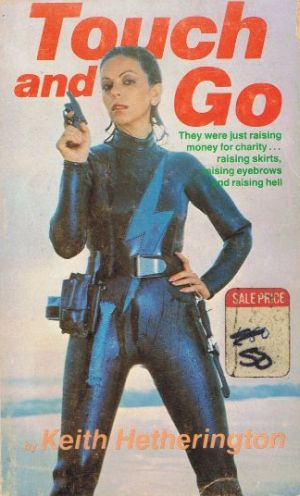★★★½
“Pretty good, but needs to get to the…ah, point quicker.”
 Two gangsters are having a discussion in a sauna, when they are brutally attacked by Raina (Katic), the former girlfriend of one. The Mexican is almost decapitated; the other, Greek mob boss Virgil Vadalos (Berenger) is gutted, but survives. He vows to track down his ex-squeeze and unleashes his forces to do so. They include the near-psychotic Lee (Biehn), who has just returend from London with an even more insane sidekick, plus dirty cop Beck (Sloan), who owes Vadalos a favour, and is involved in the investigation from the inside. Keeping those aspects separate becomes more difficult, as the waters become increasingly muddied as more bodies show up, murdered with the titular weapon, the Mexican’s colleagues plot their own revenge, and there’s also the tricky matter of several million dollars in cash which has gone missing.
Two gangsters are having a discussion in a sauna, when they are brutally attacked by Raina (Katic), the former girlfriend of one. The Mexican is almost decapitated; the other, Greek mob boss Virgil Vadalos (Berenger) is gutted, but survives. He vows to track down his ex-squeeze and unleashes his forces to do so. They include the near-psychotic Lee (Biehn), who has just returend from London with an even more insane sidekick, plus dirty cop Beck (Sloan), who owes Vadalos a favour, and is involved in the investigation from the inside. Keeping those aspects separate becomes more difficult, as the waters become increasingly muddied as more bodies show up, murdered with the titular weapon, the Mexican’s colleagues plot their own revenge, and there’s also the tricky matter of several million dollars in cash which has gone missing.
Quite an impressive cast of (admittedly, second-tier talent) assembled here: outside those already mentioned, Kelly Hu, Tom Sizemore, Dominique Swain, James Franco and D.B. Sweeney all meander across the screen. That, actually, is perhaps part of the problem here: it’s a movie that is likely guilty of trying to cram too much in. It feels overstuffed with both plot threads and characters, which leads to some underdevelopment of both, and that’s a shame, as there are more than enough interesting elements in both to hold your attention. Raina’s motivation isn’t revealed until well into the second half, but makes more than sufficient sense, and it’s wise of the makers to establish her bad-ass credentials right at the beginning. The violence to be found here is both startling and brutal – Lee’s fate is certainly one we’ll remember for a while.
However, as noted, the film seems uncertain of its grounding. Thst’s particular true during the middle, when Raina’s lethal force takes a back seat to the kind of criminal shenanigans, betrayal and back-stabbing with which we’re all overly familiar, and which is much less interesting. Debit points are also due for cover art which, as shown below, shows the heroine wielding a gun, definitely not her weapon of choice. I’m going with our pic on the right, as much more accurate. But, all told, this was better than I was expecting, and actually delivers on the spirit of the cover, if not perhaps the specific details.
Dir: Nick Vallelonga
Star: Stana Katic, Paul Sloan, Tom Berenger, Michael Biehn





 Nami is sent to jail for killing a Yakuza boss, and when she is released, returns to the Ginza district of Tokyo to live with her uncle, who runs a pool hall. She gets a job as a hostess in a bar, with the help of her new friend Ryuji (Watase), but the quiet life doesn’t last for long, even as she tries to help the widow of the man she killed – whose petition on behalf of Nami is what helped lead to her early release. For the local mob, in the shape of Okada (Nanbara) and his gang, are sniffing around the bar, seeking to take it over. To settle things, Nami offers to take on Okada’s champion at billiards, a challenge the gangster readily accepts, not realizing he has just been hustled, and that Nami is no mean player herself. Can she win – and even if she does, will Okada live up to his side of the bet?
Nami is sent to jail for killing a Yakuza boss, and when she is released, returns to the Ginza district of Tokyo to live with her uncle, who runs a pool hall. She gets a job as a hostess in a bar, with the help of her new friend Ryuji (Watase), but the quiet life doesn’t last for long, even as she tries to help the widow of the man she killed – whose petition on behalf of Nami is what helped lead to her early release. For the local mob, in the shape of Okada (Nanbara) and his gang, are sniffing around the bar, seeking to take it over. To settle things, Nami offers to take on Okada’s champion at billiards, a challenge the gangster readily accepts, not realizing he has just been hustled, and that Nami is no mean player herself. Can she win – and even if she does, will Okada live up to his side of the bet? Galia is a sex-slave, kept in captivity in an Israeli brothel. After a failed escape-bid, she is told she has one chance to get back to Russia and be reunited with her daughter: kill an enemy of the man holding her hostage. This she does, but one murder becomes another, with the lure of getting her passport returned and freedom being used to keep her working, just as when she was a prostitute. But at least she has some freedom, and moves into an apartment opposite Elinor (Tayeb), who has problems of her own, in the shape of an abusive husband. The two women bond, both sharing dreams of escaping their violence-plagued lives. However, acting on those dreams is unlikely to be easy, with the men in their lives unlikely just to let them walk.
Galia is a sex-slave, kept in captivity in an Israeli brothel. After a failed escape-bid, she is told she has one chance to get back to Russia and be reunited with her daughter: kill an enemy of the man holding her hostage. This she does, but one murder becomes another, with the lure of getting her passport returned and freedom being used to keep her working, just as when she was a prostitute. But at least she has some freedom, and moves into an apartment opposite Elinor (Tayeb), who has problems of her own, in the shape of an abusive husband. The two women bond, both sharing dreams of escaping their violence-plagued lives. However, acting on those dreams is unlikely to be easy, with the men in their lives unlikely just to let them walk. This 1980 film was originally called Friday the Thirteenth, but went through a title change in production, after they discovered some other film with that title being made… No hockey-masks to be seen here: instead, it’s the story of three young women, Eva (Hughes), Fiona (Contouri) and Millicent (Duncan), who start robbing places, largely for amusement – they donate the proceedings to an orphanage. However, after one of their victims ends up making far more money than they do, thanks to a bogus insurance claim, they switch targets and set their sights on a bigger fish, in the shape of a luxury hotel which contains a bank, jewellery store and other treats. This requires expanding their team, but with larger hauls come larger risks, as they find out, even once the actual crime has been carried out.
This 1980 film was originally called Friday the Thirteenth, but went through a title change in production, after they discovered some other film with that title being made… No hockey-masks to be seen here: instead, it’s the story of three young women, Eva (Hughes), Fiona (Contouri) and Millicent (Duncan), who start robbing places, largely for amusement – they donate the proceedings to an orphanage. However, after one of their victims ends up making far more money than they do, thanks to a bogus insurance claim, they switch targets and set their sights on a bigger fish, in the shape of a luxury hotel which contains a bank, jewellery store and other treats. This requires expanding their team, but with larger hauls come larger risks, as they find out, even once the actual crime has been carried out. Perhaps a better title, however, would be Yakuza Sister, since this is a tale of two siblings. Tamaki (Iwashita) is an actual mid-level Yakuza wife, who is running their branch of the gang in the jailed absence of her husband, and doing quite well at it, enhancing its size and reputation. She is largely estranged from both her sister Makoto (Kitase) and their father – she’s a bartender, he works in his machine shop, but it’s clear from the get-go that his time is limited [this isn’t much of a spoiler when you see him coughing his lungs out while simultaneously chain-smoking]. Two things upset their semi-orderly lives. The overall head of Tamaki’s clan dies, opening up a power vacuum which sets off a struggle between rival factions, and Tamaki attempts to arrange a ‘suitable’ marriage for her sister. Makoto rebels, taking up instead with Kiyoshi Sugita (Sera) – which is unfortunate, because he’s a loyal member of the faction now battling Tamaki’s group for control.
Perhaps a better title, however, would be Yakuza Sister, since this is a tale of two siblings. Tamaki (Iwashita) is an actual mid-level Yakuza wife, who is running their branch of the gang in the jailed absence of her husband, and doing quite well at it, enhancing its size and reputation. She is largely estranged from both her sister Makoto (Kitase) and their father – she’s a bartender, he works in his machine shop, but it’s clear from the get-go that his time is limited [this isn’t much of a spoiler when you see him coughing his lungs out while simultaneously chain-smoking]. Two things upset their semi-orderly lives. The overall head of Tamaki’s clan dies, opening up a power vacuum which sets off a struggle between rival factions, and Tamaki attempts to arrange a ‘suitable’ marriage for her sister. Makoto rebels, taking up instead with Kiyoshi Sugita (Sera) – which is unfortunate, because he’s a loyal member of the faction now battling Tamaki’s group for control. The films put out starring WWE wrestlers are a bit of a mixed bag: some are mindlessly entertaining, while others are near unwatchable. And much the same goes for their Diva’s division: some are actually good wrestlers, others are clearly chosen for their looks. Stratus does probably fall into the former category, but this doesn’t do her adequate justice, and top-billing is probably a bit of a stretch – she’s held hostage more than she kicks ass. She plays Jules, one of three bounty-hunters, who pick up a guy that suggests a deal: let him go, and he’ll point them to a wanted man with a $100,000 reward. They accept, but when taking the guy in, get a call from mob boss Hal Lambino (Rafla) who offers them one million dollars if they deliver the bail-jumper to him instead. Needless to say, the transaction doesn’t go smoothly.
The films put out starring WWE wrestlers are a bit of a mixed bag: some are mindlessly entertaining, while others are near unwatchable. And much the same goes for their Diva’s division: some are actually good wrestlers, others are clearly chosen for their looks. Stratus does probably fall into the former category, but this doesn’t do her adequate justice, and top-billing is probably a bit of a stretch – she’s held hostage more than she kicks ass. She plays Jules, one of three bounty-hunters, who pick up a guy that suggests a deal: let him go, and he’ll point them to a wanted man with a $100,000 reward. They accept, but when taking the guy in, get a call from mob boss Hal Lambino (Rafla) who offers them one million dollars if they deliver the bail-jumper to him instead. Needless to say, the transaction doesn’t go smoothly. Inspired though the alternate titling of The Bod Squad might be, the original title likely gives a better idea of the inspiration for this 1977 Shaw Brothers flick: think Charlie’s rather than deadly. Three women, from Korea, Hong Kong and Japan, under the orders of
Inspired though the alternate titling of The Bod Squad might be, the original title likely gives a better idea of the inspiration for this 1977 Shaw Brothers flick: think Charlie’s rather than deadly. Three women, from Korea, Hong Kong and Japan, under the orders of  While the title suggests something inspired by Corman’s Big Bad Mama, this is a contemporary tale which, in some ways, is actually closer to Faster Pussycat. It has a great deal more nudity, right from the opening scene in which Becky (Rialson) stares into a mirror, and puts on her bikini-top… very… slowly… However, the titular Mama (Grahame) is nowhere near the level of Varla, and the movie feels more like a pale imitation, despite the additional breasts.
While the title suggests something inspired by Corman’s Big Bad Mama, this is a contemporary tale which, in some ways, is actually closer to Faster Pussycat. It has a great deal more nudity, right from the opening scene in which Becky (Rialson) stares into a mirror, and puts on her bikini-top… very… slowly… However, the titular Mama (Grahame) is nowhere near the level of Varla, and the movie feels more like a pale imitation, despite the additional breasts. A series of bank raids has local police baffled: ‘The Executives’ specialize in slick, swift in and outs, never over-reaching themselves. They’re also very well-dressed, which might actually be a clue, since these four robbers are women, under veteran criminal Fox (Evans). But all is not well in this gang of thieves, with some seeking a bigger score. Matters come to a head when they find a cop (Lombardi) nosing around their headquarters, and a tracking device attached to their van – all signs point to an informant within the gang, Is someone seeking to take over from Fox? Or is Fox herself tired of her accomplices? Let the accusations – and the bullets – fly.
A series of bank raids has local police baffled: ‘The Executives’ specialize in slick, swift in and outs, never over-reaching themselves. They’re also very well-dressed, which might actually be a clue, since these four robbers are women, under veteran criminal Fox (Evans). But all is not well in this gang of thieves, with some seeking a bigger score. Matters come to a head when they find a cop (Lombardi) nosing around their headquarters, and a tracking device attached to their van – all signs point to an informant within the gang, Is someone seeking to take over from Fox? Or is Fox herself tired of her accomplices? Let the accusations – and the bullets – fly. All told, however, these are small quibbles, and the bottom line is: we enjoyed it. Someone should give Blinky enough money for a proper movie – but I suspect, Notarile will likely keep on making films, whether anyone does or not! I’ll be looking out for them.
All told, however, these are small quibbles, and the bottom line is: we enjoyed it. Someone should give Blinky enough money for a proper movie – but I suspect, Notarile will likely keep on making films, whether anyone does or not! I’ll be looking out for them. This was my first true vintage “pinky violence” movie, though I had bumped against some fringe entries in the genre before e.g. Female Convict Scorpion: Jailhouse 41, which I enjoyed and really must get round to reviewing for here some time. This one…not so much. It focuses on Rika (Oshida), who gets out of reform school, and gets a job as a ‘companion’ at a bar, where most of the girls have a similarly troubled background. The local Yakuza boss is sniffing around, and his path crosses Rika’s after she (semi-unwittingly) helps a colleague steal some drugs from them. As a result, the house mother/bar owner, is on the hook for three million yen, plus interest.
This was my first true vintage “pinky violence” movie, though I had bumped against some fringe entries in the genre before e.g. Female Convict Scorpion: Jailhouse 41, which I enjoyed and really must get round to reviewing for here some time. This one…not so much. It focuses on Rika (Oshida), who gets out of reform school, and gets a job as a ‘companion’ at a bar, where most of the girls have a similarly troubled background. The local Yakuza boss is sniffing around, and his path crosses Rika’s after she (semi-unwittingly) helps a colleague steal some drugs from them. As a result, the house mother/bar owner, is on the hook for three million yen, plus interest.